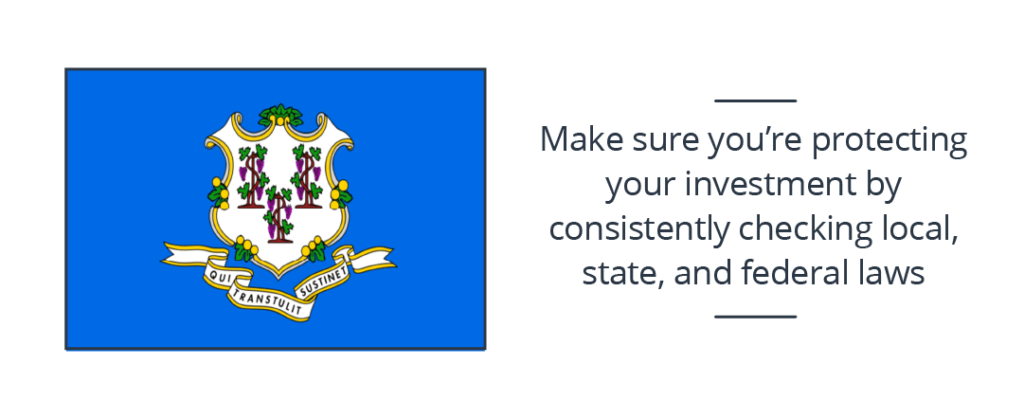Connecticut’s population has been steadily increasing over the last ten years for good reason. The state boasts great job opportunities, the fifth-highest average income, and an extremely low crime rate. The quality of life here is also nothing to scoff at. Connecticut has beautiful beaches for those who enjoy getting outside and delicious restaurants for all the foodies out there. Investors should consider purchasing rental properties in Connecticut for multiple reasons. Home values are rising and are expected to continue rising, which will make resale in the future very lucrative.

Laws that impact the rental market, landlords, and tenants are constantly being decided in states. Make sure you know what’s on your ballot – find Connecticut voting information.
Marketing. Applications. Leases. Payments.
Connecticut Renters’ Rights and Landlord Responsibilities
- Have 15 days to return the security deposit (if the tenant left a forwarding address. Otherwise, they have 30 days after the lease term ends)
- No notice required before raising rent
- Reasonable notice is required before entering
- Required to make repairs within 15 days
When it comes to Connecticut rental laws, there are a few specifics landlords need to know:
- Security Deposit – Connecticut limits the amount a landlord may charge for the security deposit to the equivalent of two months of rent. Landlords must return the deposit within 30 days of the tenant moving out.
- Raising Rent – Landlords in Connecticut may increase the rent to any amount for any reason with no notice.
- Notice of Entry – Connecticut requires landlords to give reasonable notice before entering the property and they may only enter during reasonable hours.
- Repairs – It is the landlord’s responsibility to keep the rental in safe and healthy living conditions. Landlords must make repairs within 15 days after being notified by the tenant. If the landlord fails to make repairs within this time frame, tenants may make the repairs themselves and deduct the cost from future rent payments or file a complaint with the housing court.
Connecticut Landlords’ Rights and Tenant Responsibilities
- Tenants have three days to pay rent after they receive a notice
- Must give a three-day notice before terminating a lease
- Tenants must keep the unit in a safe and habitable condition
- A tenant has 60 days to claim abandoned property
Overdue Rent – If a tenant fails to pay rent on time, the landlord must give them a three-day notice to pay or quit. If the tenant fails to pay, the landlord may file for eviction.
Terminating a Lease – If a tenant needs to terminate a month-to-month lease, they must give the landlord a three-day notice.
Tenant Responsibilities – Tenants are required to keep the property clean, not disturb neighbors, and make small repairs.
Abandoned Property – If a tenant moves out and leaves personal property, the landlord must notify them and store the property for 60 days. After this period, if the ex-tenant has not claimed it, the landlord must send it to the Department of Administration.
Rental Application Fees
Connecticut landlords can only charge an application fee if it matches the actual costs of a screening report.
Criminal Background Checks
- HUD (Federal) laws do not classify criminal backgrounds as a protected class, but making a decision to rent based on a criminal background alone could lead to a discrimination charge as it impacts certain protected groups of people disproportionately.
- However, if the criminal background check revealed a crime for the manufacture and distribution of drugs, homicide, and/or stalking, denying the application is allowed.
- Landlords should have a consistent and equal policy or procedure in place regarding criminal background checks to avoid discrimination.
- HUD states that a landlord cannot ask about arrest records, only convictions, as innocent people are commonly arrested though the situation may not have resulted in a conviction.
- Some municipalities may have written their own laws expanding on what you can and cannot ask regarding criminal backgrounds during the tenant screening process.
Security Deposits
- The maximum amount that can be charged for a security deposit is two months’ rent unless the tenant is 62 years old or older. Senior tenants can only be charged one month’s rent for a security deposit.
- Landlords must hold security deposits in an escrow account in a financial institution within the state.
- Landlords are required to give earned interest to the tenant except when the rental unit is a mobile home or a dorm. The rate of interest changes annually and is determined by the State Commissioner.
- Landlords must return a security deposit within 15 days of the tenant providing a forwarding address or 30 days after the lease term ends, whichever is later.
Discrimination
Connecticut state law adds additional protection for tenants on the basis of marital status, age, ancestry, and lawful source of income.
Late Fees
Landlords must provide a nine-day grace period for the payment of rent before charging a reasonable late fee.
Rental Agreement Disclosures
Connecticut landlords must disclose:
- If the rental unit is within a common interest community.
- For all units required to have fire sprinkler systems under CT code, Landlord must disclose:
- A notice of operable fire sprinkler system in the building/premises
- The system’s maintenance and repair history
- If there is an adjacent property infested with bed bugs
- The following regarding the security deposit:
- The name of the FDIC-escrow account
- The bank’s address
- The amount held
- The name of the FDIC-escrow account
Build a Connecticut lease agreement in 15 minutes or less.
Connecticut Lease Agreement Sample
There are three sections to a residential lease agreement. The first section outlines the custom details of the contract, such as who’s involved and for what address. Here’s an example Connecticut lease agreement listing details found in Section 1:
| Property Address: | 1200 Broadway Ave. Unit #104 Hartford, CT 06101 | |
| Lease Start Date | 3/01/21 | See section 1.5 |
| Lease End Date: | 2/28/22 | See section 1.5 |
| Total Monthly Rent: | $1,620.00 | See section 1.6 |
| Monthly Base Rent: | $1,500.00 | See section 1.6 |
| Monthly Pet Rent: | $120.00 | See section 1.6 |
| Prorated Rent Amount: | $1,000.00 | See section 1.10 |
| Total Deposit(s): | $1,500 | See section 1.8 |
| Security Deposit: | N/A | See section 1.8 |
| Pet Deposit: | N/A | See section 1.8 |
| Other Deposit: | N/A | See section 1.8 |
| Total Non Refundable Fee(s): | $100.00 | See section 1.9 |
| Move-in Fee: Description | $100.00 | See section 1.9 |
| Late Fee: | 5% if not paid by the 10th. | See section 2.1 |
Connecticut Landlord-Tenant Law FAQ
Below are answers to some of the most commonly-asked questions when it comes to landlord-tenant laws in Connecticut:
Can You Withhold Rent in Connecticut?
The only instance where a tenant may withhold rent is if a landlord fails to make requested repairs. Tenants may pay for the repairs themselves and deduct the cost from the following rent payments.
How Long Does it Take to Evict a Tenant in Connecticut?
Evicting a tenant in Connecticut can take anywhere from 4 to 7 weeks, depending on the reason for eviction.
Is Connecticut a Landlord-Friendly State?
Connecticut is considered a less landlord-friendly state because tenants have more rights and fewer restrictions compared to other states.
What is the Eviction Process in Connecticut?
There are seven reasons a landlord may file for eviction in Connecticut. The seven reasons include failure to pay rent, violation of the lease agreement, the end of the lease term, owner’s personal use of the rental unit, discontinuance of use of the rental unit, refusal to accept rent increase, and illegal activity. Depending on the violation, the landlord must give the tenant notice and anywhere from 3 to 15 days to cure their violation.
If the tenant fails to cure or quit, then the landlord may file a complaint with the court, which costs $175. After the complaint is filed, it will be served to the tenant at least 12 days before the hearing.
After the tenant is served with the summons, they must file an appearance within two days of the date listed on the summons. After, the hearing will be scheduled within 7-10 days of the answer being filed.
If the court rules in favor of the landlord, then a writ of execution will be issued five days later. The tenant will have 24 hours to move out.
How Much Notice Does a Landlord Have to Give a Tenant to Move Out in Connecticut?
Landlords must give a three-day notice before asking a tenant to vacate the property.
Due Diligence and Connecticut Rental Laws
TurboTenant has utilized many municipal sources along with official state statutes in order to compile this information to the best of our ability. However, local laws are always in flux, and landlords and tenants alike should be sure to do their due diligence and consult legal help when it’s needed. We hope the following list can serve as a valuable resource and allow you to succeed as a landlord or tenant in Connecticut. Be sure to take proper precautions when it comes to finding the top candidates for your unit by utilizing our online rental application and tenant screening services.
Disclaimer: TurboTenant, Inc does not provide legal advice. This material has been prepared for informational purposes only. All users are advised to check all applicable local, state, and federal laws, and consult legal counsel should questions arise.
Connecticut Landlord-Tenant Law Resources
- Rights and Responsibilities of Landlord and Tenant
- Advance Rental Payment. Security Deposits
- Health and Safety Standards in Rented Dwelling
- Entry and Detainer
- Court Proceedings on Housing Matters
- Summary Process (Eviction)
- Connecticut Law about Landlord/Tenant Law
Connecticut Fair Housing Resources
Other State Resources
- Rights and Responsibilities of Landlords and Tenants in Connecticut
- Summary Process (Eviction) for Landlords – Handbook
- Summary Process (Eviction) for Tenants – Handbook
- Security Deposit Law
- Landlord / Tenant / Housing- Frequently Asked Questions
Connecticut Associations
Connecticut City-Specific Housing Resources
Bridgeport
- Housing & Commercial Code Enforcement – City of Bridgeport
- Fair Housing Commission – City of Bridgeport
- Greater Bridgeport Board of REALTORS®
New Haven
- Housing Code of the City of New Haven
- Rental Licensing and Inspection Program – City of New Haven
- New Haven Middlesex REALTORS®
Hartford
- Housing Code Enforcement – City of Hartford
- Fair Rent Commission – City of Hartford
- Fair Housing Program – City of Hartford
- Greater Hartford Association of REALTORS®
Stamford
- Security Deposits – City of Stamford
- Evictions – City of Stamford
- Affirmative Fair Housing Marketing – City of Stamford
- Stamford Board of REALTORS®
Waterbury
Norwalk
- Fair Rent – City of Norwalk
- Fair Housing – City of Norwalk
- Mid-Fairfield County Association of REALTORS®





